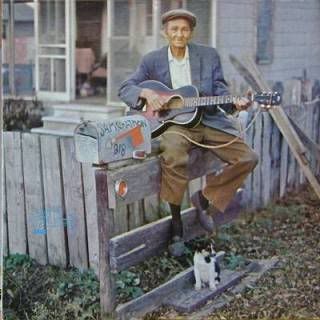Song of the Day
 Sam Chatmon with his guitar and his dog Charley in front of his home in Hollendale Mississippi.
Brownskin Women- Sam Chatmon
Sam Chatmon with his guitar and his dog Charley in front of his home in Hollendale Mississippi.
Brownskin Women- Sam Chatmon I first met Sam Chatmon when I reviewed blues concert of his with another blues legend Sleepy John Estes at Webster Groves University in St. Louis in the early Seventies. Sam was the longest living of the first generation of the original blues singers from the Mississippi delta region and a bit of a living legend among blues fans.
Sam was the brother of blues master Lonnie Chatmon and half-brother of the notorious ragtime singer Bo Carter. Bo Carter was the founder of the Mississippi Sheiks the very first blues band and both Lonnie and Sam Chatmon were members of the Mississippi Sheiks in it's glory days in the 1920s. The Sheiks not only played the blues but also mastered most of the jazz and ragtime standards of the day. Both the Chatmon and Carter families were all high colored (light skinned) French creole blacks, many of whom passed for white under Jim Crow laws, but Sam told me he never thought of himself as anything other than a black man from Mississippi.
From the birth of the Mississippi blues in the second decade of the 20th Century, the Sheiks set the standard of musicianship. Their records often sold over 10,000 copies which was the equivalent of double platinum in the black music industry in the 20s and 30s. In those days a blues song was a smash hit if it sold 4 to 5 thousand units.
Before the rise of Ellington and Basie in the mid Thirties, the blues and jazz music of black musicians wasn't played on the radio. In the Twenties, the jukebox in a black owned juke joint was the only place to hear the latest blues and jazz hits in the rural South. The Mississippi Sheiks were instantly recognizable music stars in this world of juke joints and road houses in the rural south in the 1920s.
The Sheiks were certainly better known in their own time, than the "father of the delta blues," Robert Johnson. Chatmon was 14 years older than Robert Johnson and as a young teenager Johnson idolized music of the Sheiks and Lonnie Chatmon in particular. Robert Johnson lived long enough to record an albums worth of music that was released in 1937 and a few months later Johnson was murdered shortly before he was to appear at the 1938 Spirituals to Swing Concert in Madison Square Garden in New York which would have undoubtedly launched his career.
In the early 1930s Sam Chatmon left the Mississippi Sheiks and went solo Throughout the '30s, Sam traveled throughout the south, playing with a variety of minstrel and medicine shows. Sam told me that Robert Johnson frequently played on the same bill as his opening act. Another much younger aspiring blues player named Muddy Waters also opened shows for Sam Chatmon in the late 1930s. He stopped traveling in the early 1940s, making himself a home in Hollandale, Mississippi, where he worked on the local cotton plantations.
Sam jump started his musical career during the blues revival of the late Sixties and enjoyed another 15 years in the musical spotlight, right up until his death in 1983. Sam was truly grateful for another shot at the stage when he was well past retirement age. Sam used to say,"There aren't many second acts in life, but I'm one of them." He was right and Sam went on and outlived all of his first generation blues contemporaries like Furry Lewis, Skip James, Mississippi John Hurt, and Bukka White who also got a second chance at stardom during the blues revival of the 60s.
The song embedded,
Brownskin Women is a variation on Big Road Blues a song originally recorded by another one Sam Chatmon's musical peers, Tommy Johnson. Notice how Sam works the walking bass line on his guitar... He reaches under the low E string with his thumb and then snaps off the low E string to get an amazing effect. Sam is one of a less than a dozen or so blues guitarists who mastered this difficult technique. Sam always told me he invented the this string snapping technique. He also told me he was only guitarist on the face of the earth who knew how to snap the strings in precisely the right manner. You hear a lot of this sort of self promoting bravado and musical brinksmanship if you hang around long enough with old blues men, but as far as I could tell Sam wasn't just making an idle boast with that particular story of his.